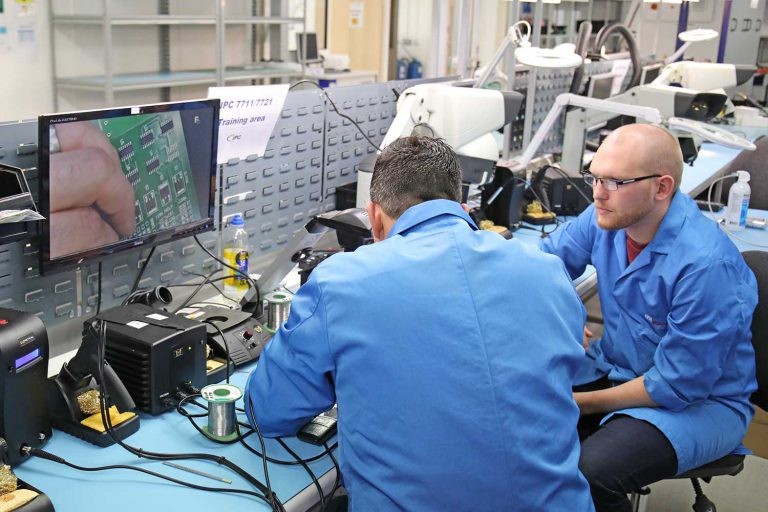Ritchie Eagleton and Sonney Badhan (left) are qualified IPC trainers at OSI Electronics’ UK facility in St Neots, Cambridgeshire.
They have recently trained all shop floor staff to IPC-A-610 Class 3. In addition, Ritchie is training 45 specialists in the shop floor team to IPC 7711 and five to IPC 7721 certification.
Manufacturing electronic devices is a mixture of automated production and hand work – a common function is soldering components, wires and cables.
There is great value for producer and customer in soldering being top quality – it is here where the inspection to IPC 610 standards is important, for a device will pass though many processes during its manufacture and all operatives at OSIE UK are empowered to be critical of work which is sub-standard.
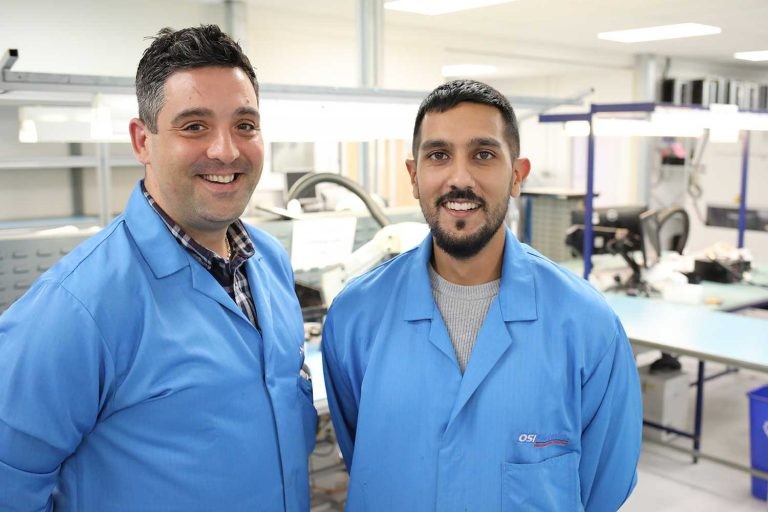
About IPC standards
There are three classes of IPC 61
Class 1 Disposable electronics – e.g. TV remote control units. The lifetime of these products is limited and a failure is not critical.
Class 2 Worthwhile / economic to repair products – e.g. mobile phones, lap top computers. The lifetime of the products is longer than class 1, the amount of usage is higher and an uninterrupted service is desirable.
Class 3 Life essential equipment – e.g. high reliability / critical electronic products for medical, military and aerospace applications. These products are expected to have a long lifetime and must function without interruption; downtime is not an acceptable option.
Nearly all of OSIE UK’s output falls into classes 2 and 3 – with every operative trained to Class 3, they know the visual acceptabilities of the soldering for each type of component and can inspect the quality of the solder for all types of electronic assemblies.
IPC 7711 covers the physical rework of PCBs and IPC 7721 the repair and modification of PCBs, including complex repairs to damaged laminates, pads and tracks.
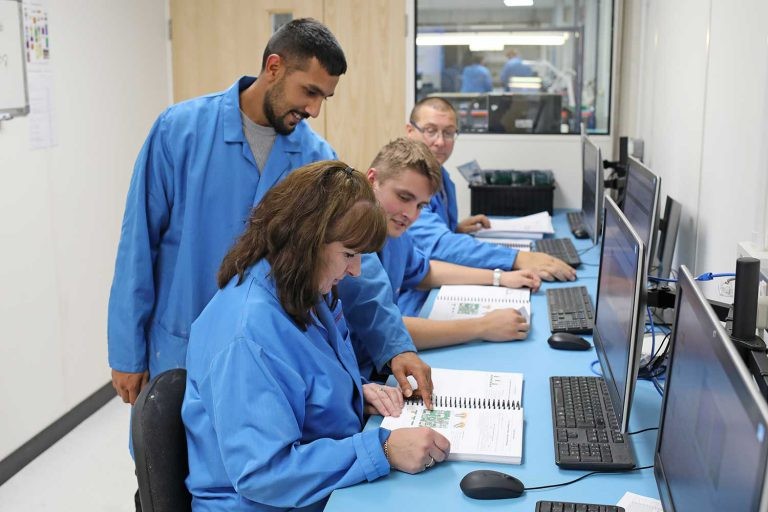
High levels of knowledge
Ritchie has been at OSIE for four years, joining the company as an assembler, moving on to reworking and is now process supervisor in the hand soldering department. He obtained the IPC 610 and 7711/21 training qualifications in February 2019.
Sonney has five years with OSIE, also in final assembly before going across to programming and operating flow soldering and selective soldering machines. He also obtained his IPC 610 training qualification in February 2019.
“We have considerable practical experience of making and working on PCBs – as do nearly all our colleagues,” said Ritchie.
“The level of operator knowledge here is very good,” added Sonney. “They know what they are talking about, especially the ones who have been in the industry a long time.”
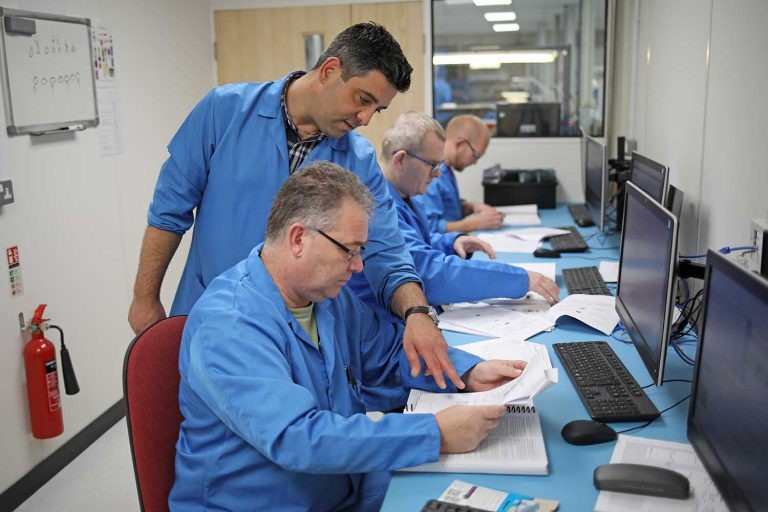
Formalising standards
“The point of the training is to formalise everyone’s knowledge and way of working, to upskill and ensure every operator is going by the book, in the correct way and to the very high standards demanded by IPC procedures,” said Ritchie.
For IPC 610 class 3, operators are trained to recognise the ideal solder joints for surface mount, high voltage, through hole, terminal connections, MELF devices, caps and resistors etc, as well as how a component should sit on the board, discreet wiring and how leads should bend.
Every customer order specifies an IPC 610 class, generally 2 or 3, although some orders include specific instructions for individual components to be class 3 when the rest of the device is class 2. This would be flagged up so the operative knows what to inspect for.
Practice based training
7711/21 training is module and practice based. It includes the basics of how to look after and maintain a soldering iron and different wetting angles as well as the specifics of wire splicing and repairs, conformal coating repairs – quite difficult because of the laminate cover – through hole rework, SMT chip capacitor and MELF rework, J-lead, BGA and laminate repair, wire modifications and track and pad repairs.
“For IPC 7711, rework to the board, say changing a component, must leave the board looking exactly as if it were new,” said Ritchie.
“Repairs and modifications [IPC 7721] can involve track and pad repairs, wire mods and repairing laminate damage where we mill into the board and fill with epoxy – it won’t look ‘as new’ but we get very close while retaining all the board’s functions.
“IPC 7711 and 7721 are particularly important for medical device companies, for whom we do a lot of work. They need to know who within OSIE can do PCB rework and repairs to the IPC standard, especially track repairs which is a specialist skill in its own right.”
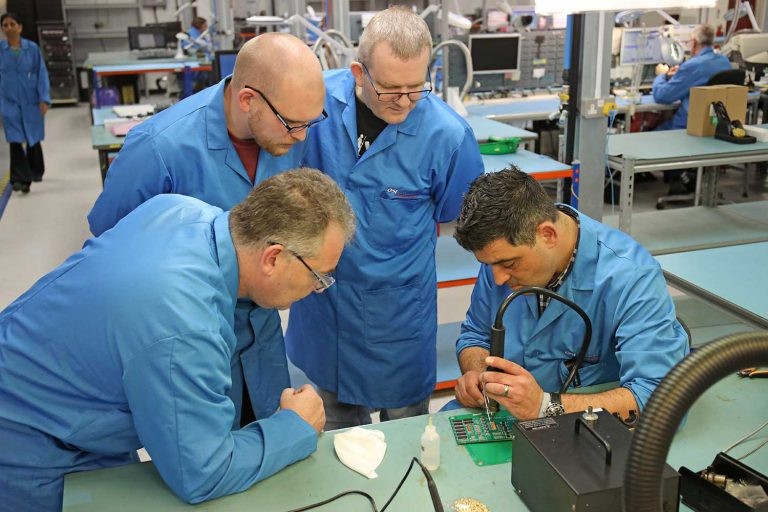
Excellent teacher’s report
Both Ritchie and Sonney were trained by Electronics Group in Leeds and are full of admiration for they help and knowledge they passed on – John O’Neill, Ritchie’s 7711 trainer, was equally impressed:
‘It was one of the most enjoyable 7711 courses I have run in the seven years I have been a Master IPC Trainer.
‘The goal of the 7711 course is to remove and replace through hole and surface mount components and to achieve the quality of the original machine assembled board.
‘Ritchie achieved this – sometimes it was very hard to distinguish between original assembly and the rework as the quality of his soldering was that good.’
“I always wanted to become an IPC trainer,” said Ritchie. “I want everyone to work to the same level, doing exactly the same type of thing rather than having differences here and there.”
“The best thing about IPC being in house now is we don’t have to get a training company to come in,” added Sonney. We can train people as and when necessary to fit in with our production schedules rather than when a trainer is available”.
“IPC is the industry standard – which is good for everything we produce in St Neots while being trained to IPC standards also benefits an employees’ career,” said Ritchie.
“We would like to become Master Trainers and establish a training centre here at OSIE in St Neots so we can teach some of our colleagues to become trainers and also open the centre to other companies.
“OSIE has put a lot of faith into us. We’ve had very good feedback from senior management and our shop floor colleagues, which we appreciate. It is very satisfying to know by getting everyone to focus on achievable standards, we’re also helping to fill skill gaps and improve employee performance.”
Liam Dixon, OSI Electronics UK’s Production Manager, said: “OSIE UK has long prided itself on quality, service and delivery on time.
“Achieving IPC quality standards by all our shop floor staff is part of our continual programme of ensuring upon delivery all the electronic products we manufacture work first time, every time.”
